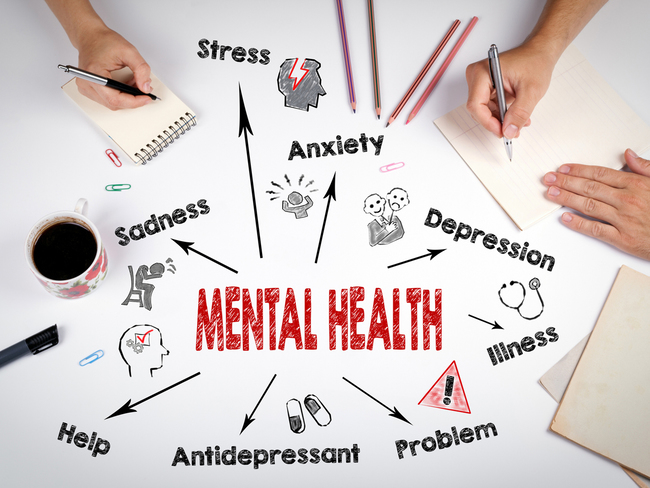If you are someone who worries a lot, experiences stress regularly or has trouble managing stress, it can start to impact your life. The Canadian Mental Health Association provides tips on boosting your mental health and living a healthier, happier life.
Mental health is essential for living a happier life. Exercise and mental health are critical factors in improving mental health, and reducing stress is crucial. Canadian Mental Health Association provides tips on how to boost your mental health.
What is Mental Health?
Mental health is a state of well-being in which every individual realizes their potential, can cope with the everyday stresses of life, work productively and fruitfully, and contribute to their community. Mental health is not a diagnosis or a medical condition but rather a state of Mind. It is essential to overall health and cannot be treated with medication.

Signs and Symptoms of Poor Mental Health
Poor mental health can be exhibited in many ways, including mood, thoughts, or behavior changes. Some signs and symptoms of poor mental health include feeling sad or down, anxious or stressed, having problems sleeping, eating too much or too little, withdrawing from friends and activities, feeling irritable, and feeling hopeless or helpless. If you or someone you care about is exhibiting these signs and symptoms, it is essential to seek help immediately.
The Importance of Mental Health
Mental health is just as important as physical health. Just like your body needs exercise and healthy foods to function correctly, your Mind needs stimulation and healthy activities to stay healthy. When your mental health is in good shape, you feel good about yourself and your life. You have the energy and enthusiasm to take on challenges and reach your goals. But when your mental health is poor, you may feel sad, anxious, or stressed. You may have trouble sleeping, eating, or concentrating.
How to Improve Your Mental Health
There are many ways that you can improve your mental health. Some people may find that exercise or journaling helps, while others may find therapy or medication necessary. Incorporating exercise into your daily routine is a great way to manage your mental health. If you’re feeling anxious or stressed, avoiding stressful situations is normal. However, avoidance only adds to your anxiety. Let’s take a look at some different ways you can work on improving your mental health.
Tips for Dealing with Poor Mental Health
If you are experiencing poor mental health, there are some things that you can do to help yourself. Firstly, it is essential to understand that mental health is just as important as physical health. You should make sure to take care of yourself both mentally and physically. Here are some tips for dealing with poor mental health:- Seek professional help. There is no shame in seeking professional services when struggling with mental health.
Exercise and Mental Health
Exercise has been shown to improve mental health in several ways. It increases the production of endorphins, hormones that create a sense of euphoria. It also improves sleep quality and overall mood by decreasing depression, anxiety, anger, and stress symptoms. There is no single “right” way to exercise to improve your mental health. What matters most is finding what works for you and doing it consistently. Don’t forget about your social connections.
Studies have found that making and maintaining social connections is one of the most important things to improve mental health. Good social links can reduce loneliness and improve your mental health. Here are some activities you can do to make and maintain healthy relationships: Join clubs or organizations, get involved in social causes you care about, volunteer your time to help others, and attend community events.
Nutrition and Mental Health
A healthy diet is essential for maintaining mental health. Eating nutritious foods helps to keep your body and Mind functioning correctly. When you are well-nourished, you can better handle stress and stay positive. A balanced diet provides the energy to think clearly and stay focused.
Things you should keep in your Mind
- What are some good foods to eat for mental health?
- How does a healthy diet help with mental health?
- What are the benefits of a balanced diet?
- What foods should I avoid if I want to maintain mental health?
- Are there any special diets that can help improve mental health?
- What is the relationship between stress and mental health?
- How can I stay positive and handle stress effectively?
While plenty of foods contain caffeine, the effects of consuming caffeine alone are different from those of a well-balanced diet. It is recommended that adults get approximately 400-500 mg of caffeine per day in their diet from natural sources, such as coffee, tea, cola, and cocoa. The recommended amount of caffeine for children and adolescents is 300-400 mg daily. This is about 1-2 cups of caffeinated coffee or tea.
Reducing Stress for Better Mental Health
Reducing stress for better mental health can be accomplished in many ways. Some people find relief through exercise, meditation, or therapy. Others find that simplifying their lives and setting limits helps reduce the amount of stress they experience. Many people find relief by adopting a “mindful” or “default mode” of functioning. Researchers have found that awareness of one’s thoughts and feelings can help reduce stress.
Conclusion
There are many ways to reduce stress, but one of the most important is to take care of your mental health. Make sure to take time every day to relax and de-stress. You can read, listen to music, or walk outdoors. If you’re struggling to manage your stress independently, reaching out for help is essential.





